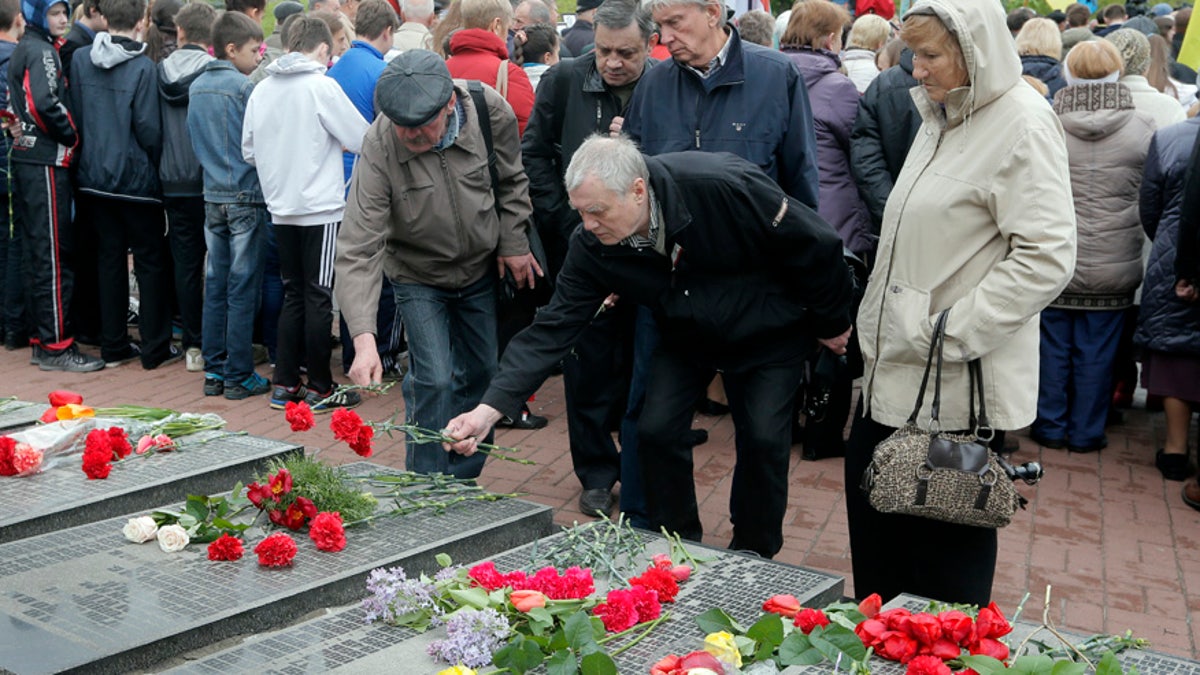
April 26, 2016: Ukrainians lay flowers to the tombstone that bears their relative's names, during a ceremony to commemorate victims of Chernobyl tragedy at a monument to them in Ukraine's capital Kiev, Ukraine. (AP)
“When evening starts, I cower and sit in the corridor. There’s rustle, and a rocket is flying. I pray, God, please, let it miss the house, let it miss the house.” -- A woman living in Makiivka, Ukraine
Donald Trump’s recent comments about Russia and Ukraine brought the conflict back to the attention of our nation this past weekend. What people might fail to realize is the sheer scale of the humanitarian crisis in the Ukraine because of that conflict.
The lives of millions of Ukrainian men, women, and children teeter on the edge.
An elderly Ukrainian woman I’ll call Ellen told a World Help partner, "My grandson and I live in a village a few kilometers from the front lines in eastern Ukraine,” she said. “We have a big family—three children, four grandchildren, and elderly relatives we care for. With so many of us living together we have nowhere to go. Every day we hear shooting, people die, and we are surrounded by an atmosphere of fear and hopelessness. The children are frightened by loud noises, we have little food, and we haven't been receiving pensions or salaries since the beginning of the war.”
In eastern Ukraine, where pro-Russian separatists and government forces have been clashing for the last two years, normal life consists of praying explosive shells won’t land in your living room, “we're caught in a trap—we can't stay, but we have nowhere to go. We don't even have anyone to talk to about our problems, because everyone around us is in the same situation.” Life was not always like this for Ellen and her family.
Two years ago a revolution promised to take Ukraine out of the clutches of a political carousel and into economic and social reform. The road to reform had been bloody, but the future seemed partly hopeful, almost optimistic: A reborn Ukraine peered from the horizon, with another opportunity to show the world why she could also be a modern nation like the rest of Europe.
Then Russia invaded Crimea starting a crisis that continues throughout various regions of Ukraine. Over the years, several ceasefires—one of which lasted only three days—have been negotiated between Ukraine and Russia, yet the conflict has found no resolution. In the midst of the ensuing and spectacular political war of words between the two nations, a humanitarian crisis, set on low fire, has now come to a boil.
According to a report released last month by the United Nations Human Rights Office of the High Commissioner (OHCHR), the crisis in Ukraine has now claimed the lives of 9,371 people—2,000 of these civilians killed mostly by shelling—and wounded 21,532 others. Almost 2 million Ukrainians have been internally displaced by the fighting in east Ukraine, and an estimated 2.7 million—400,000 of these children—lie trapped in the separatists’ self-proclaimed states.
Ukraine is the forgotten humanitarian crisis of 2016.
Many of the internally displaced people can’t find employment, lack basic food and hygiene supplies, and are living in overcrowded refugee camps. Medical services in the outskirts of metropolitan areas are underfunded and overstretched.
“Why us, why us? It is not a life. We are a family of six surviving on two pensions. Neither of us can afford medication. They would have better killed us here than suffering like this,” said an elderly woman with cancer living in Donetsk city.
Aggravating the situation is the fact that humanitarian aid organizations - like ours - have been barred access to some of these areas, and as the conflict drags on, the living conditions continue to deteriorate.
In sum, if you are from eastern Ukraine, you are either trapped in the war zone, living under the anxiety of militants, or you are displaced from your home, wandering west, seeking opportunities the government can’t provide.
The promise of a new Ukraine seems to have vanished from sight. The future now lies buried under the rubble of shelling and the weight of a failing economy.
Ellen still has hope, but it isn’t in any government. “Only God can help us,” she said.
In our obsession with politics in this country, we mustn’t forget the lives actually affected by our policies.
